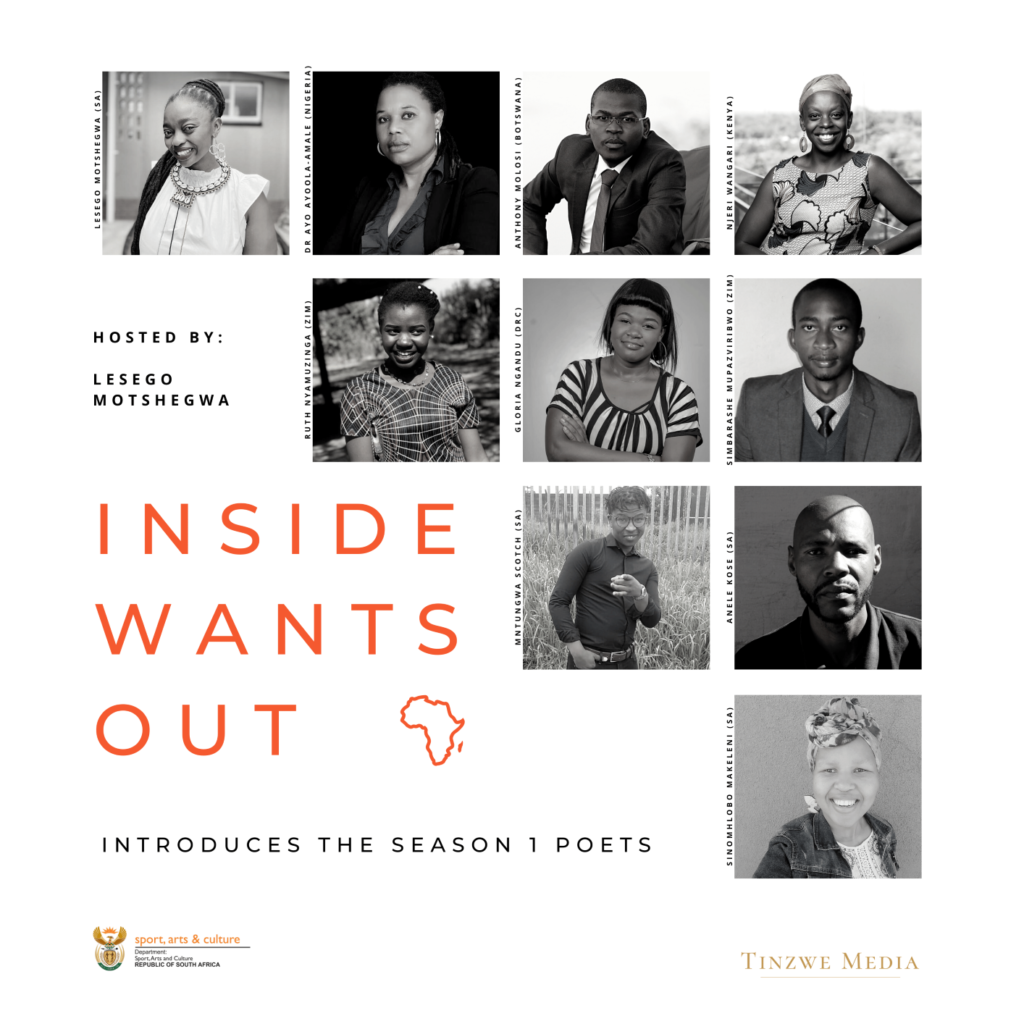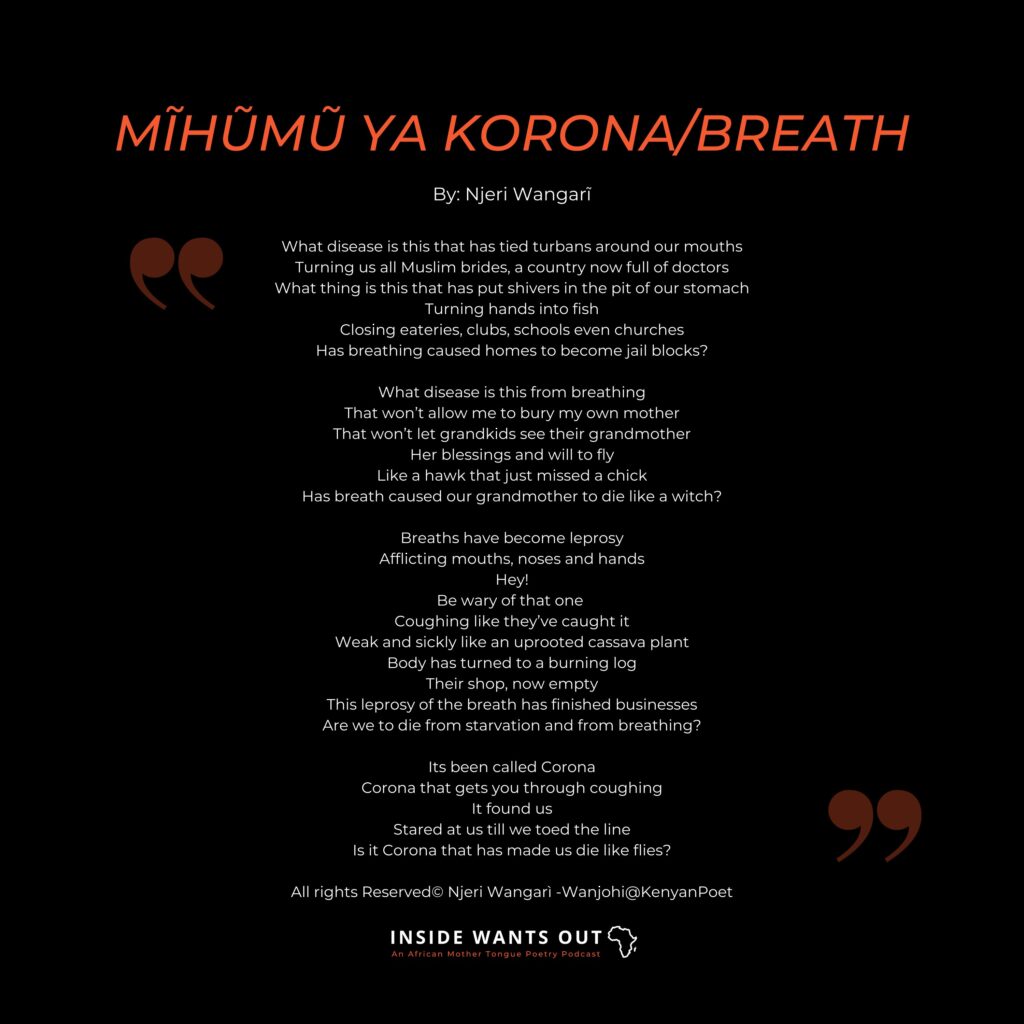
Last year in October, I got to learn of a call for poetry submissions for an African Mother tongue poetry podcast project by Tinzwe Media. The project was powered by the South African Department of Sports, Arts and Culture (DSAC) and the theme for season one of the podcast was ‘African Poetry in the Time of a Global Pandemic’.
I hadn’t yet written any poems specifically on the pandemic. This was going to be a great challenge. They not only required poems on the theme, the pieces needed to be written and recorded in one’s mother tongue. I was elated.
I am quite passionate about language. It is the window through which we look out and understand the world around us. It is the door through which we step out or let others in, to our experiences as we tell our story and speak our truth.
I take great pride in knowing my mother tongue Gĩkũyũ (often pronounced as Kikuyu). I was fortunate to learn it when growing up in my rural village, Wangige. I often remind those who doubt my command of the language that I learnt English using Gĩkũyũ in Nursery school right through to class three. This was normal then till the late 80s.
Thus, my first poetry collection – Mines & Mind fields; My Spoken Words featured quite a number of poems in Gĩkũyũ.
When this challenge presented itself, I could not have been more eager to pen down something. Two months later, I received a congratulatory email informing me that I had been selected as one of only ten Poets to feature in the project’s season one.
My Poem Mĩhũmũ (Breath) was inspired by my observations of the devastation COVID-19 continues to have on families & societal structures, sources of livelihood.
The project which featured ten poets from six African countries who each provided their original vocal delivery of their poems went live on 7th December. Each episode featured an introduction from the poet, then listeners got to hear an original poem delivered in their mother tongue and lastly, the English translation of the poem.
Season one featured Zimbabwean poets Ruth Rafaro Nyamuzinga and Simbarashe Mupazviribwo; Nigeria’s Dr. Ayo Ayoola-Amale, Myself (Kenya’s Njeri Wangari) Anthony ‘AnthXny’ Molosi from Botswana, Gloria Ngandu of the Democratic Republic of Congo and South Africa’s Mntungwa Scotch, Anele Kose and Sinomhlobo Makeleni.
Now available on YouTube, Spotify and Apple Podcasts, listeners can enjoy poems in Yoruba, Tswana, Swahili, Shona, Xhosa, and Kikuyu. Each episode has been creatively presented by Lesego Motshegwa. A former journalist, Lesego has been working closely with the Tinzwe team to become the thread that ties the podcast together.
Here’s the poem with the English translation
Mĩhũmũ
Nĩ mũrimu uriku ũyũ watũma tũohe iremba tũnua
twahana thweri, bũrũri waihũra arigitani
nĩ kanyamũ karĩkũ gaaka gatũingĩria heho nda
gatua moko maitũ ciũngũyũ
kaahinga mĩkawa, irabu, mathukuru nginya kanitha
ni mĩhũmũ yatũma mũcie ĩtuĩke njeera?
Nĩ mũrĩmu ũrikũ ũyũ wa mĩhũmũ
wagiria thike maitũ
waingata tũcũkũrũ kũng’etia cũwe
irathimo na igai ciombũka
ta hũngũ ĩremetwo kũhuria
Ni mĩhũmũ yatũma cũcũ akue wiki ta mũrogi?
Mĩhũmũ itũikite mangũ
mangũ ya kanua, maniũrũ na mooko
Haiya, we!
ndwĩhũũge ũcio arakorora ta enayo
aarigooya ta gĩkwa kĩmunye
mwĩrĩ watuĩka giciinga
nginya duka, ha kũrĩmia hooma
mangũ ya mĩhũmũ ni yaniaria mawĩra
Tũgũkua nĩ ng’aragu na tũũragwo ni mĩhũmũ?
ĩĩretwo korona
korona ya gũkorora
yatũkora,
yatũrora, nginya twarora hamwe
nĩ korona yatũma tũkue ta ngi?
All rights Reserved© Njeri Wangarì -Wanjohi
@KenyanPoet
28th October 2020
